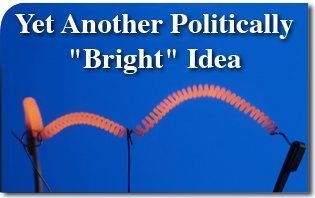 As we near the end of 2011, the controversy over the banning of incandescent light bulbs blazes on. The Energy Independence and Security Act of 2007 brought together the government, fanatical environmentalists and big-business lobbyists to pass a law that will gradually outlaw the majority of household incandescent bulbs. Now, it appears that the ban has been postponed until next year.
As we near the end of 2011, the controversy over the banning of incandescent light bulbs blazes on. The Energy Independence and Security Act of 2007 brought together the government, fanatical environmentalists and big-business lobbyists to pass a law that will gradually outlaw the majority of household incandescent bulbs. Now, it appears that the ban has been postponed until next year.
The reprieve was won not because bulb opponents have seen the light. Rather, Senate Democrats sacrificed the ban as part of a deal to pass a spending bill at literally the eleventh hour when it was introduced before midnight on December 14. Neatly buried in a massive 1,200-page $1 trillion omnibus-spending package, the provision does not overturn the ban but prevents the government from spending any money to enforce it. This is a temporary stay of execution for the 100-watt bulb, but only until next year.
With this in mind, we cannot expect any new incandescent light bulb factories to open in the near future. General Electric just closed their last one in Virginia in September 2010. Without Congress blocking enforcement for funding again next year, we may well see the end of Thomas Edison’s invention once and for all.
As with any poorly made plan, this too has resulted in problems such as massive layoffs in Ohio, Virginia and Kentucky in the light bulb manufacturing industry and obliges Americans to purchase more expensive bulbs with a long return on their investment. On top of this, the majority of these bulbs are made in China.
Even the principal argument in favor of outlawing incandescent light bulbs — the environmental one — does not hold water. It seems that no one is talking much about toxins released when disposing of these new bulbs. Nor are they mentioning the fact that some big-business interests favor the new bulbs because they are a high profit margin item as opposed to low profit for the old bulbs. This results in additional revenues for stockholders, but not for all stakeholders such as factory workers.
It becomes painfully evident that the incessant mantra about saving the environment and our natural resources is merely empty rhetoric behind which is an ideological agenda. If our government only examined the facts available to the public, our legislators would see that this great debate over the lowly light bulb makes no sense at all. In fact, the whole idea, for lack of better words, is a dim one.

